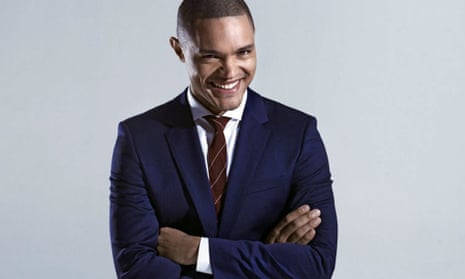Is the US a shining city upon a hill for comedians worldwide? There’s a vintage example of American exceptionalism in the Financial Times this week, by the paper’s US editor Gary Silverman. The article is about the appointment of Trevor Noah to the vacant Jon Stewart berth on The Daily Show. But Noah’s controversial Twitter history isn’t what concerns Silverman. Instead, he sees Noah’s career arc – growing up bi-racial in Soweto, where “my existence itself was a crime”, emigrating to America, working his way up in short order to the most prestigious satire gig in the country – as a classic tale of “American soft power”. “The American style in comedy,” Silverman writes, “has grown so pervasive that our television producers can find people suitable for our entertainment formats all over the planet.” It’s as if the world’s tired, poor, huddled masses want nothing more than to present comedy formats on US TV – and the US, in its infinite beneficence, is happy to provide them.
It’s a timely moment for Silverman to make the case – he cites James Corden, newly recruited to the The Late, Late Show on CBS, as further evidence. Brummie comic John Oliver, host of HBO’s Last Week Tonight, gets name-checked too. So is this just classic three-instances-equals-a-trend journalism, or does the FT have a point? Certainly, Silverman’s reasoning doesn’t do his argument many favours. As a country of immigrants or outsiders, he argues, America lends itself to comedy. Which is fair enough, but he extrapolates that point ad absurdum, arguing that insiders or majority peoples (Jewish Israelis are his example) can’t be funny because they’re preoccupied with exercising their power. Which will be news to the countless Wasp American comics whose excellence has helped Silverman construct his argument.
He also airbrushes the role the English language plays in all this. The Bric countries will never boast America’s cultural influence, he gloats, as if this was down to the US’s inherent magnificence, rather than the fact it speaks the global language. Britain benefits from this too, and its comedy industry likewise attracts talent from all around the world. Including America, some of whose finest comics, under-appreciated in the States, have had their greatest success away from home. Bill Hicks is the standout example. Rich Hall, Reg Hunter, and acts such as Doug Stanhope and Bo Burnham have all, to varying degrees, found the UK’s comedy scene more amenable than the one they left behind.
Then there’s the issue of whether Noah’s brand of standup can be described as “the American style in comedy”. It’s often said that America invented standup, and so it did, in much the same way as England invented football or Christians invented morality – ie in each case, a code of conduct was attached to something that existed anyway and would probably have developed along the same lines regardless. There clearly is such a thing as “American soft power”, and it’s powerful. Hollywood casts its spell; hip-hop likewise. But I don’t think John Oliver’s ambition to be a comedian means he was in its thrall. It might just mean he was a teenage fan of The Young Ones. And – while we’re on the subject – how uniquely American is The Daily Show format anyway? Isn’t it a bit like its UK precursor by two years, The Day Today, or indeed That Was the Week That Was?
And yet – painful though it is to admit it, Silverman’s final conclusion may be valid. “Only in America,” he signs off, and he might be right about that. Can you imagine a UK equivalent of The Daily Show (that is, a show of national cultural significance) recruiting a little-known, mixed-race South African host such as Noah? Is it possible that, in fairly quick succession, three major TV comedy formats would hire foreigners as hosts? The UK’s live comedy industry can go toe-to-toe with America’s for quality and, I’d guess, diversity. But there’s no way Noah could have made his way so easily into the centre of our national conversation. On that point at least, Silverman – and America – have every right to feel triumphant.

Comments (…)
Sign in or create your Guardian account to join the discussion